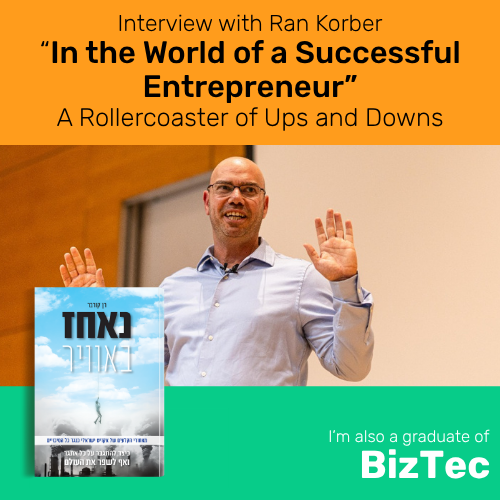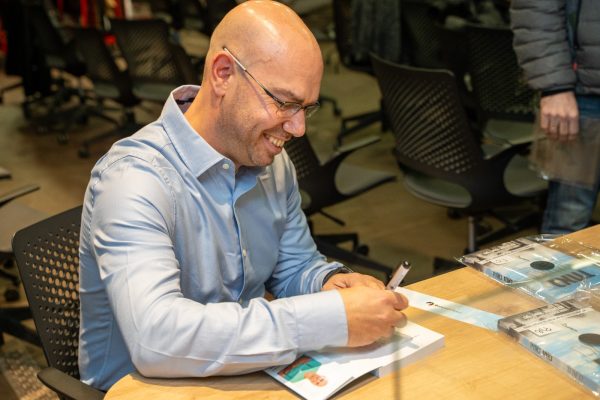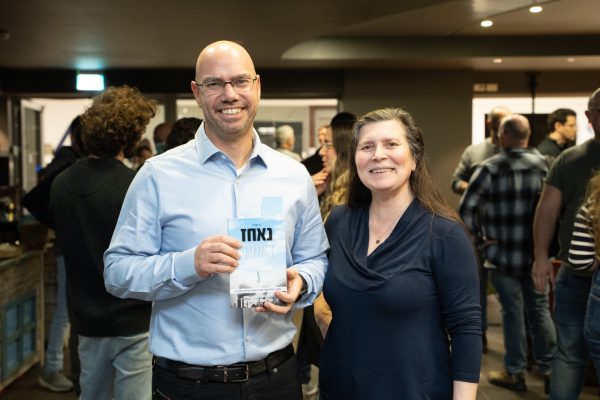
“Grasping at Air”: A Rare Glimpse into the Inner World of a Successful Entrepreneur – Ran Korber
Ran Korber's new book shares rare insights into the challenges behind building a successful high-tech startup.
About Ran:
Ran Korber, an environmental engineer and Technion graduate, is a serial entrepreneur and influential figure in the Israeli tech scene. He co-founded and served as CEO of BreezoMeter, an app that provides real-time air quality data—born from his personal struggle to find such information while house-hunting in northern Israel.
In 2022, under his leadership, BreezoMeter was acquired by Google in what is considered one of the most successful exits in Israeli climate-tech.
Today, Ran teaches entrepreneurship at the Technion and continues to champion environmental innovation.
Recently, Korber published his book, "נאחז באוויר" which chronicles his journey toward the long-awaited exit and offers a rare glimpse into the challenges that lie beyond the technical aspects.
In our interview, Korber shares deep insights into building a company, managing a team, finding the right partners, navigating crises, and blending diverse fields of knowledge.
Entrepreneurship Begins with a Good Story: On Writing "Grasping at Air"
When asked about the process of writing a book, Korber compares it to a famous singer performing at Caesarea:
"A singer opens with a hit, adds new songs in the middle, and finishes with more hits. But in a book, you need to keep readers hooked the whole time—because unlike a concert, people can leave and get distracted by a million things. That's what will make them come back."
According to him, the goal is to craft a compelling narrative that keeps readers engaged from start to finish.
Boarding the Train, New Beginnings: How It All Started
Korber describes the beginning of his journey as "a very challenging time." After a brief period as an officer in the army, he had planned to take a short break—but life had other plans."My father came to me and said, ‘We spoke with the neighbor—he runs a gas station and has a job for you. You start tomorrow. Saturday.' That's when I realized I'd better start looking for work. In our house, there was always an expectation to work—even the day after being discharged."
He later worked as a security guard at a chemical plant, where he was first exposed to the world of environmental engineering. That spark led him to study the field at the Technion, where he was offered a student position as an environmental engineer before even completing his degree.
"Environmental engineering is essentially about developing and applying technologies that help protect the environment," Korber explains.
He takes particular pride in projects like the rehabilitation of the Kishon River. What makes the field so meaningful, he says, is the opportunity to take environments damaged by human activity and work to restore them—to give nature a chance to regenerate and biodiversity a chance to thrive once more.
The Power of Combining Worlds: Environmental Engineering and High-Tech
The transition from environmental engineering—a field not traditionally associated with high-tech—to the startup world felt natural for Korber. He quotes Steve Jobs' famous idea of "connecting the dots":
"You can't connect the dots looking forward; you can only connect them looking backward. So you have to trust that the dots will somehow connect in your future."
Korber shares how he first learned programming during his military service:
"I was a combat soldier, got injured, and my medical profile was lowered... A friend opened a programming course in the Signal Corps—what's now the Cyber and Technology Unit—so that's how I learned to code."
At the Technion, Korber felt it was odd not to apply modern tech tools to environmental engineering.
"We'd solve complex equations—either by hand or in Excel—while I was writing code. In MATLAB. I realized early on that these worlds needed to be connected."
A guiding quote at BreezoMeter captured this mindset:
"When you combine different disciplines, you create something people didn't know they needed—but now can't live without."
Startup CEO: Two Worlds, One Reality
Over the course of a decade as an entrepreneur—from idea to exit—Korber led BreezoMeter to international recognition, meeting global leaders including the President of France, the President of the United States, and many others.
Yet, he reveals the stark contrast between the public image of a successful startup CEO and the behind-the-scenes reality:
"On the outside, for example when I met former U.S. President Barack Obama, I was the CEO of a successful startup. But the inner reality was very different: at the time, our team had just seven people. My salary was very low, close to minimum wage. My wife and I were deep in debt… I didn't even own a car."
In the early days, his role as CEO often included unglamorous tasks—like ordering office food or replacing light bulbs.
"After we raised a seed round and could hire more engineers to scale the product globally, my goal was to enable 100% productivity for the dev team. So anything that wasn't programming—I handled. I didn't study at the Technion to order groceries or issue pay slips, but if that's what needed to be done, I did it."
Korber adds that leadership also means leading by example:
"You're the one flying to meet Obama, talking to investors and clients—and when needed, cleaning the office. That's what inspires your team."


Work-Life Balance and Personal Goals
Navigating between the external world and your inner reality—and balancing strategic management with daily tasks—is a daily challenge that requires a delicate equilibrium.
Ran emphasizes how crucial your close environment—family, friends, and community—is to your success as an entrepreneur:
"If your partner, children, or parents don’t truly understand what it means to be an entrepreneur, if they’re not part of the bigger picture and don’t help set clear boundaries with you—it can be very difficult. It’s important that everyone understands the reality, recognizes the sacrifices, and sets clear limits—otherwise, you’ll tear yourself apart from within."
Korber tries to meet at least two young entrepreneurs every week to share his knowledge and experience, helping them see the bigger picture—that entrepreneurship is part of a full life, not isolated from it.
He also discusses the difference between types of goals and how to achieve them:
"Many people think every goal is just ‘a little better,’ but that’s not true. There’s a difference between ‘double goals’—which require steady improvement—and ‘tenfold goals’—which are real breakthroughs demanding fundamental change. For example, if you want to have an average score of 99, you can’t study like everyone else—you have to study in a completely different way. Interestingly, sometimes the big change—the revolution—is actually simpler than constant burnout."
Facing Crises and Finding Partners
According to Korber, the COVID-19 pandemic was an opportunity for growth:
"Every crisis gives you a chance to grow if you take advantage of it and learn properly. That was our opportunity."
He quotes Churchill: “Never let a good crisis go to waste.”
Regarding finding partners, Korber relies on research from universities and venture capital funds:
"Studies on optimal partner-finding show the best teams are made up of people who have worked together before—whether in the same workplace or on joint projects during their studies—which is a principle the Technion supports."
Advice for Young Entrepreneurs: Learn, Build, and Sell
Korber offers three key pieces of advice for early-stage entrepreneurs:
Build and Sell:
"If you have an idea you believe in and are passionate about, just create it and try to sell it." He notes that today, with AI tools, it’s possible to develop digital products quickly—even without prior programming knowledge. This is covered in the courses he teaches.
Never Stop Learning:
"Constantly read books, meet people, watch lectures on YouTube, listen to podcasts—there’s endless knowledge out there." Korber stresses that for every challenge—no matter how strange—someone has gone through something similar.
Find Partners:
"Always ask yourself: Who can join me? Who do I want to work with? Who fits this role?"
In closing, Korber recommends three books:
“The Secret” by Rhonda Byrne (for success in life),
“High Performance Habits” by entrepreneur Brandon Burchard (for success at work),
and “Zero to One” by venture capitalist and entrepreneur Peter Thiel (for entrepreneurship), which he calls “the Bible of entrepreneurship” and has read dozens of times himself.

"נאחז באוויר"
Ran Korber’s recently released book, “Grasping at Air,” offers a fascinating look into the world of entrepreneurship beyond the screens and headlines. The book provides valuable tools and insights for anyone aiming to succeed on a similar path, revealing the challenges and struggles beyond the technical side of building a high-tech company.
Ran Korber lectures at the Technion in two courses:
“High-Tech in Israel: How to Lead Globally,” for which he received a commendation for teaching excellence, and
“Entrepreneurship in Organizations – Trends and Developments,” taught alongside Dr. Dina Rafael.
He is also a guest lecturer in various courses within the T-Hub program. Korber brings a unique blend of hands-on experience and innovative thinking, bridging the worlds of high-tech, academia, and entrepreneurship.
For ordering the book and more content on entrepreneurship and success in life—




